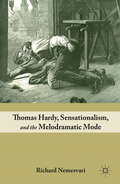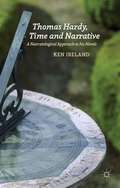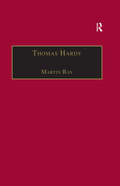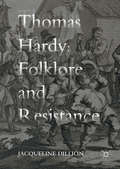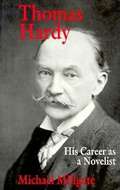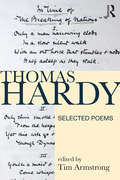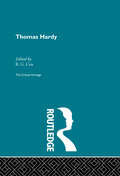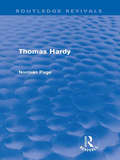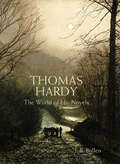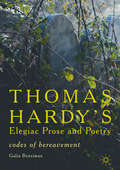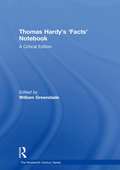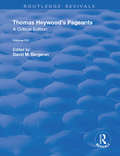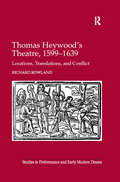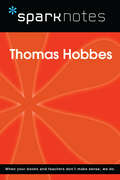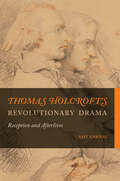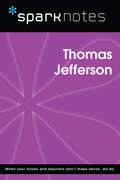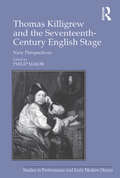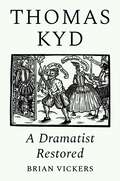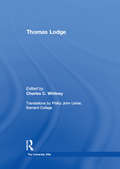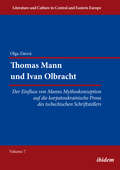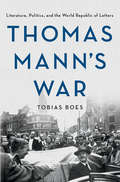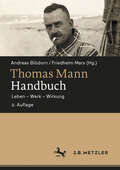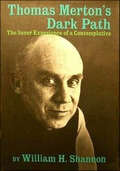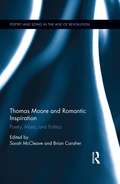- Table View
- List View
Thomas Hardy, Sensationalism, and the Melodramatic Mode
by Richard NemesvariThe first full-length study of sensationalist and melodramatic elements in Hardy's novels uses six of his texts to demonstrate the ways in which Hardy uses the melodramatic mode to advance his critique of established Victorian cultural beliefs through the employment of non-realistic plot devices and sensational 'excess. '
Thomas Hardy, Time and Narrative
by Ken IrelandHow is Hardy's development of thematics and characters matched by that of narrative techniques and his handling of time? This book uses narratological methods to stress the interdependence of content and expression in a key transitional writer between the Victorian and Modernist eras.
Thomas Hardy: A Textual Study of the Short Stories (The Nineteenth Century Series)
by Martin RayThis is the definitive textual analysis of all of Hardy's collected short stories, tracing the development of each from manuscript, through newspaper serial versions, galley proofs and revises to collected editions in volume form. It is no surprise to discover that Hardy's capacity for inveterate revision is manifested in his tales as it was in his novels. Even those stories for which he professed little regard were meticulously and continuously revised, in some cases more than thirty years after their first publication. The alterations extend to the most minute details of plot, landscape, characterisation and style, as well as the restoration of bowdlerised passages which had been demanded by serial magazines. This study will play a major role in elevating the importance of this genre in Hardy's prolific output and will illuminate his textual practices - an area of considerable and growing interest to a large number of scholars and students.
Thomas Hardy: Folklore and Resistance
by Jacqueline DillionThis book reassesses Hardy's fiction in the light of his prolonged engagement with the folklore and traditions of rural England. Drawing on wide research, it demonstrates the pivotal role played in the novels by such customs and beliefs as 'overlooking', hag-riding, skimmington-riding, sympathetic magic, mumming, bonfire nights, May Day celebrations, Midsummer divination, and the 'Portland Custom'. This study shows how such traditions were lived out in practice in village life, and how they were represented in written texts - in literature, newspapers, county histories, folklore books, the work of the Folklore Society, archival documents, and letters. It explores tensions between Hardy's repeated insistence on the authenticity of his accounts and his engagement with contemporary anthropologists and folklorists, and reveals how his efforts to resist their 'excellently neat' categories of culture open up wider questions about the nature of belief, progress, and social change.
Thomas Hardy: His Career as a Novelist
by Michael MillgateFrom the preface: "This study of Thomas Hardy's career and achievement as a novelist is primarily critical in aim and emphasis: it proceeds largely in terms of independent discussions of the various novels. But my endeavour throughout has been to bring the results of scholarly research directly to bear upon the processes of analysis and evaluation-to consider Hardy's fiction in the context of available biographical and bibliographical knowledge and in relation to the social and intellectual milieux within which he lived and worked at various periods."
Thomas Hardy: Selected Poems (Longman Annotated Texts)
by Tim ArmstrongIn Thomas Hardy: Selected Poems Tim Armstrong brings together over 180 poems in the first comprehensively annotated selection of Hardy's poetry. Unlike most previous selections, this edition preserves the shape of the poet's career by presenting the poems in the order in which they appeared in the Collected Poems of 1930, rather than re-ordering them thematically. Head notes to each poem give the reader information about its composition, publication, sources and metrical scheme; on-the-page notes list significant variants in Hardy's manuscripts, point out literary and other allusions, and give explanatory glosses. An appendix contains a selection of relevant passages from Hardy's notebooks, letters, and autobiography; and a bibliography suggests further reading.Tim Armstrong's critical Introduction discusses Hardy's career, his poetics, his use of memory and allusion and examines his position in the context of Victorian debates on aesthetics and belief. The generous selection of poems includes many lesser-known poems as well as those which have received most critical commentary, and the important elegiac sequence 'Poems of 1912-13' is included in its entirety.
Thomas Hardy: The Critical Heritage (Critical Heritage Ser.)
by R. G. CoxFirst published in 2002. Routledge is an imprint of Taylor & Francis, an informa company.
Thomas Hardy: The Novels (Routledge Revivals)
by Norman PageFirst published in 1977, this concise and insightful study of the life and works of Thomas Hardy provides a thorough examination of Hardy's literary output. Alongside a brief biography of Hardy's life, Professor Page's study also spotlights his major and minor novels, his short stories, his non-fiction prose and his verse.
Thomas Hardy: The World of His Novels
by J. B. BullenA study of the fictious world in Hardy’s novels in relation to real places and Hardy’s real-life experiences.Thomas Hardy’s Wessex is one of the great literary evocations of place, populated with colourful and dramatic characters. As lovers of his novels and poetry know, this ‘partly real, partly dream-country’ was firmly rooted in the Dorset into which he had been born.J. B. Bullen explores the relationship between reality and the dream, identifying the places and the settings for Hardy’s writing, and showing how and why he shaped them to serve the needs of his characters and plots. The locations may be natural or man-made, but they are rarely fantastic or imaginary. A few have been destroyed and some moved from their original site, but all of them actually existed, and we can still trace most of them on the ground today.Thomas Hardy: The World of his Novels is essential reading for students of literature and for all Hardy enthusiasts who want to gain new insights into his work.Praise for Thomas Hardy“Take pleasure in a book like this one, which skillfully interweaves its evocative accounts of Hardy’s life, of Dorset and Cornwall places, and of the stories unfolded from places in six of his novels (and a few poems) so that we vividly re-experience them. . . . The pleasures of this book (and they are real) come from its ability to re-enchant us in a way that is not un-Hardy-like, to draw us again into the intensely seen, heard, and felt world of the novels and poems. It set me to re-reading Hardy, with different eyes.” —Review 19
Thomas Hardy’s Elegiac Prose and Poetry
by Galia BenzimanThis book examines the transition from traditional to modern elegy through a close study of Thomas Hardy’s oeuvre and its commitment to mourning and remembrance. Hardy is usually read as an avowed elegist who writes against the collective forgetfulness typical of the late-Victorian era. But Hardy, as argued here, is dialectically implicated in the very cultural and psychological amnesia that he resists, as her book demonstrates by expanding the corpus of study beyond the spousal elegies (the “Poems of 1912-1913”) to include a wide variety of poems, novels and short stories that deal with bereavement and mourning. Locating the modern aspect of Hardy’s elegiac writing in this ambivalence and in the subversion of memory as unreliable, the book explores the textual moments at which Hardy challenges binary dichotomies such as forgetting vs. remembering, narcissism vs. unselfish commitment, grief vs. betrayal, the work of mourning vs. melancholia, presence vs. absence. The book's analysis allows us to relate Hardy’s elegiac poetics, and particularly his description of the mourner as a writer, to shifting late-Victorian conceptualizations of death, memory, art, science and gender relations.
Thomas Hardy’s ‘Facts’ Notebook: A Critical Edition (The Nineteenth Century Series)
by William GreensladeWithin weeks of Thomas Hardy’s return to his native Dorchester in June 1883, he began to compile his ’Facts’ notebook, which he kept up throughout the years when he was writing some of his major work - The Mayor of Casterbridge, The Woodlanders, Tess of the d’Urbervilles and Jude the Obscure. From his intensive study of the Dorset County Chronicle for 1826-1830, he noted and summarised into 'Facts' (with the help of his first wife, Emma) hundreds of reports, many of them suggestive 'satires of circumstance', for possible use in his fiction and poems. Along with extensive reading in memoirs and local histories, this immersion in the files of the old newspaper involved him in a wider experience - the recovery and recognition of the unstable culture of the local past in the post-Napoleonic war years before his birth in 1840, and before the impact of the modernising of the Victorian era. 'Facts' is thus a unique document amongst Hardy's private writings and is here for the first time edited, the text transcribed in 'typographical facsimile' form, together with substantial annotation of the entries and critical and textual introductions.
Thomas Heywood's Pageants (Routledge Revivals)
by Thomas HeywoodPublished in 1986: This book is about the shows which were put on during the inauguration of new Mayors of London. Such pageants were processions through the city of London with tableaux vivants; some of the shows also included dramatic entertainment on the Thames.
Thomas Heywood's Theatre, 1599–1639: Locations, Translations, and Conflict (Studies in Performance and Early Modern Drama)
by Richard RowlandIn this major reassessment of his subject, Richard Rowland restores Thomas Heywood-playwright, miscellanist and translator-to his rightful place in early modern theatre history. Rowland contextualizes and historicizes this important contemporary of Shakespeare, locating him on the geographic and cultural map of London through the business Heywood conducts in his writing. Arguing that Heywood's theatrical output deserves the same attention and study that has been directed towards Shakespeare, Jonson, and more recently Middleton, this book looks at three periods of Heywood's creativity: the end of the Elizabethan era and the beginning of the Jacobean, the mid 1620s, and the mid to late 1630s. By locating the works of those years precisely in the political and cultural conflicts to which they respond, Rowland initiates a major reassessment of the remarkable achievements of this playwright. Rowland also pays attention to Heywood in performance, seeing this writer as a jobbing playwright working in an industry that depended on making writing work. Finally, the author explores how Heywood participated in the civic life of London in his writings beyond the playhouse. Here Rowland examines pamphlets, translations, and the sequence of lord mayor's pageants that Heywood produced as the political crisis deepened. Offering close readings of Heywood that establish the range, quality and theatrical significance of the writing, Thomas Heywood's Theatre, 1599-1639 fits a fascinating piece into the emerging picture of the 'complete' early modern English theatre.
Thomas Hobbes (SparkNotes Philosophy Guide)
by SparkNotesThomas Hobbes (SparkNotes Philosophy Guide) Making the reading experience fun! SparkNotes Philosophy Guides are one-stop guides to the great works of philosophy–masterpieces that stand at the foundations of Western thought. Inside each Philosophy Guide you&’ll find insightful overviews of great philosophical works of the Western world.
Thomas Holcroft’s Revolutionary Drama: Reception and Afterlives (Transits: Literature, Thought & Culture, 1650-1850)
by Amy GarnaiA key figure in British literary circles following the French Revolution, novelist and playwright Thomas Holcroft promoted ideas of reform and equality informed by the philosophy of his close friend William Godwin. Arrested for treason in 1794 and released without trial, Holcroft was notorious in his own time, but today appears mainly as a supporting character in studies of 1790s literary activism. Thomas Holcroft’s Revolutionary Drama authoritatively reintroduces and reestablishes this central figure of the revolutionary decade by examining his life, plays, memoirs, and personal correspondence. In engaging with theatrical censorship, apostacy, and the response of audiences and critics to radical drama, this thoughtful study also demonstrates how theater functions in times of political repression. Despite his struggles, Holcroft also had major successes: this book examines his surprisingly robust afterlife, as his plays, especially The Road to Ruin, were repeatedly revived worldwide in the nineteenth century.
Thomas Jefferson (SparkNotes Biography Guide)
by SparkNotesThomas Jefferson (SparkNotes Biography Guide) Making the reading experience fun! SparkNotes Biography Guides examine the lives of historical luminaries, from Alexander the Great to Virginia Woolf. Each biography guide includes:An examination of the historical context in which the person lived A summary of the person&’s life and achievements A glossary of important terms, people, and events An in-depth look at the key epochs in the person&’s career Study questions and essay topics A review test Suggestions for further reading Whether you&’re a student of history or just a student cramming for a history exam, SparkNotes Biography guides are a reliable, thorough, and readable resource.
Thomas Killigrew and the Seventeenth-Century English Stage: New Perspectives (Studies in Performance and Early Modern Drama)
by Philip MajorDespite his significant influence as a courtier, diplomat, playwright and theatre manager, Thomas Killigrew (1612-1683) remains a comparatively elusive and neglected figure. The original essays in this interdisciplinary volume shine new light on a singular, contradictory Englishman 400 years after his birth. They increase our knowledge and deepen our understanding not only of Killigrew himself, but of seventeenth-century dramaturgy, and its complex relationship to court culture and to evolving aesthetic tastes. The first book on Killigrew since 1930, this study re-examines the significant phases of his life and career: the little-known playwriting years of the 1630s; his long exile during the 1640s and 1650s, and its personal, political and literary repercussions; and the period following the Restoration, when, with Sir William Davenant, he enjoyed a monopoly of the London stage. These fresh accounts of Killigrew build on the recent resurgence of interest in royalists and the royalist exile, and underscore literary scholars' continued fascination with the Restoration stage. In the process, they question dominant assumptions about neatly demarcated seventeenth-century chronological, geographic and cultural boundaries. What emerges is a figure who confounds as often as he justifies traditional labels of dilettante, cavalier wit and swindler.
Thomas Kyd: A Dramatist Restored
by Brian VickersA groundbreaking new account of the author of The Spanish Tragedy that establishes him as a major Elizabethan dramatistThomas Kyd (1558–1594) was a highly regarded dramatist and the author of The Spanish Tragedy, the first revenge tragedy and the most influential Elizabethan play. In this first full study of his life and works, Brian Vickers discusses Kyd&’s accepted canon as well as three additional plays Vickers has newly identified as having been written by Kyd—exciting discoveries that establish him as a major dramatist.Thomas Dekker, a fellow Elizabethan dramatist, referred to &“industrious Kyd,&” which suggests a greater output than the three plays traditionally attributed to him—The Spanish Tragedy, Soliman and Perseda, and Cornelia. Kyd worked between 1585 and 1594, when the plague led to the anonymous publication of many plays because of the breakup of several London theatre companies. Researching this corpus, Vickers has identified Kyd&’s authorship of three more plays: Arden of Faversham, the first domestic tragedy, King Leir and his three daughters, a tragicomedy that provided Shakespeare with his main source, and Fair Em, a love comedy. These attributions are based on two forms of evidence: unique similarities of plot between Kyd&’s acknowledged and newly attributed plays and many unique phrases shared by all six plays as identified by modern software.Discussing all the plays in detail and placing them in biographical and historical context, Thomas Kyd offers a major reassessment of an underappreciated Elizabethan playwright.
Thomas Lodge (The University Wits)
by Charles C. WhitneyThomas Lodge was the most versatile of the pioneering professional writers of the English Renaissance, experimenting in an astonishing variety of forms. His long, eventful, and well-documented life makes him one of the most individualized figures of his age, and yet also one of the most representative. This is the first-ever collection of Lodge scholarship. It comprises a selection of the best and most important biographical and critical work, ranging from 1932 to 2008 and including first-time English translations. Charles Whitney's discerning introduction discusses each article or book chapter in the context of Lodge scholarship and beyond, and is supplemented by a bibliography of additional material. This unique collection offers a distinctive vantage on both Lodge and many current topics in Renaissance and early modern studies such as humanism, republicanism, romance, intertextuality, plagiarism, gender, colonization, Shakespearean sources, the histories of print and of reading, authorship, and English Catholicism and religious conflict.
Thomas Mann und Ivan Olbracht [German-language Edition]: Der Einfluss von Manns Mythoskonzeption auf die karpatoukrainische Prosa des tschechischen Schriftstellers (Literature and Culture in Central and Eastern Europe #7)
by Olga ZitováZitovás literary analysis starts at the interface of Czech and German literature in the first half of the twentieth century. Thomas Mann's novel Joseph and His Brothers is set in comparative relation to Ivan Olbracht's prose texts Nikola Šuhaj loupe ník and Golet v údolí. Olbracht translated three volumes of Mann's Joseph's tetralogy parallel to the composition of his own prose works. Zitová examines the influence of Olbracht's translation work on his own work. Zitovás literaturwissenschaftliche Analyse setzt an einer Schnittstelle der tschechischen und deutschen Literatur in der ersten Hälfte des zwanzigsten Jahrhunderts an. Thomas Manns Roman Joseph und seine Brüder wird vergleichend in Beziehung gesetzt zu Ivan Olbrachts in den dreißiger Jahren entstandenen Prosatexten Nikola Šuhaj loupe ník und Golet v údolí. Olbracht übersetzte parallel zur Abfassung seiner Prosawerke insgesamt drei Bände aus Manns umfangreicher Josephs-Tetralogie. Diese Übersetzertätigkeit blieb, wie Zitová aufzeigt, nicht ohne Einfluss auf sein eigenes Schaffen. Das Buch knüpft an eine von Jirí Opelík geschriebene Studie Olbrachts reife Schaffensperiode sub specie seiner Übersetzungen aus Thomas Mann und Lion Feuchtwanger (1967) an, in der dieser tschechische Literaturwissenschaftler das Thema eröffnete. Mit Zitovás Tiefenanalyse schließt sich diese germanobohemistische Forschungslücke.
Thomas Mann's The Magic Mountain (Modern Critical Interpretations)
by Harold BloomEssays by Hermann J. Wiegand, Erich Heller, Georg Lukacs, C. E. Williams, T. J. Reed, W. H. Bruford, Henry Hatfield, and Alexander Nehamas.
Thomas Mann's War: Literature, Politics, and the World Republic of Letters
by Tobias BoesIn Thomas Mann's War, Tobias Boes traces how the acclaimed and bestselling author became one of America's most prominent anti-fascists and the spokesperson for a German cultural ideal that Nazism had perverted.Thomas Mann, winner of the 1929 Nobel Prize in literature and author of such world-renowned novels as Buddenbrooks and The Magic Mountain, began his self-imposed exile in the United States in 1938, having fled his native Germany in the wake of Nazi persecution and public burnings of his books. Mann embraced his role as a public intellectual, deftly using his literary reputation and his connections in an increasingly global publishing industry to refute Nazi propaganda. As Boes shows, Mann undertook successful lecture tours of the country and penned widely-read articles that alerted US audiences and readers to the dangers of complacency in the face of Nazism's existential threat. Spanning four decades, from the eve of World War I, when Mann was first translated into English, to 1952, the year in which he left an America increasingly disfigured by McCarthyism, Boes establishes Mann as a significant figure in the wartime global republic of letters.
Thomas Mann-Handbuch: Leben – Werk – Wirkung
by Andreas Blödorn Friedhelm MarxDer Literaturnobelpreisträger von 1929: Thomas Mann gehört zu den produktivsten, wichtigsten und wirkungsreichsten deutschsprachigen Autoren der Moderne. Seine Romane, Erzählungen, Essays, Briefe und Tagebücher reflektieren und prägen die erste Hälfte des 20. Jahrhunderts in einer Weise, wie es kaum einem anderen Schriftsteller gelungen ist. Das Handbuch umfasst fundierte Einzelbeiträge zum literarischen Werk und dessen Kontext, zu wichtigen Motiven und aktuellen Forschungstendenzen. Neben der Werkschau enthält es einen ausführlichen Teil zur Person im Kontext der Zeit und zur Rezeption bis hin zu den aktuellen Verfilmungen. Die zweite, aktualisierte Auflage wurde um zahlreiche Einzelbeiträge zu wichtigen Texten sowie zu politischen und poetologischen Aspekten seines Werks und um ausgewählte Illustrationen erweitert.
Thomas Merton's Dark Path: The Inner Experience of a Contemplative
by William H. ShannonIn the mystical tradition the "dark," or apophatic way has a long history. It is the way of John of the Cross, of Master Eckhart, of Juliana of Norwich, of the anonymous author of The Cloud of Unknowing, and of Thomas Merton. This dark path of contemplation that Merton followed, wrote about extensively, and considered the focal point of his life is the subject of William H. Shannon's book.
Thomas Moore and Romantic Inspiration: Poetry, Music, and Politics (Poetry and Song in the Age of Revolution)
by Sarah McCleave Brian G. CaraherWritten by internationally established scholars of Thomas Moore’s music, poetry, and prose writing, Thomas Moore and Romantic Inspiration is a collection of twelve essays and a timely response to significant new biographical, historiographical and editorial work on Moore. This collection reflects the rich variety of cutting-edge work being done on this significant and prolific figure. Sarah McCleave and Brian Caraher have contributed an introduction that positions Moore in his own time (1800-1850), addresses subsequent neglect in the twentieth century, and contextualises the contemporary re-evaluation of Thomas Moore as a figure of considerable interdisciplinary artistic and cultural significance. The contributions to this collection establish Moore’s importance in the fields of Neoclassical and Romantic lyricism, musical performance, song-writing, postcolonial criticism, Orientalism and biographical writing— as well as defining the significance of his voice as an engaged social and political commentator of a strongly cosmopolitan and pluralistic inclination.
